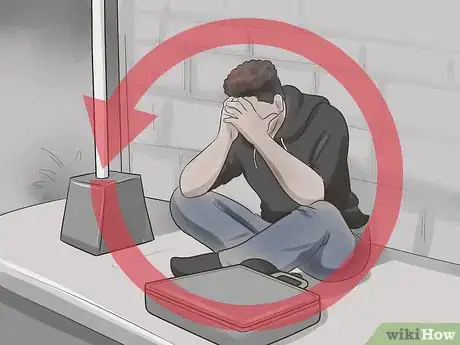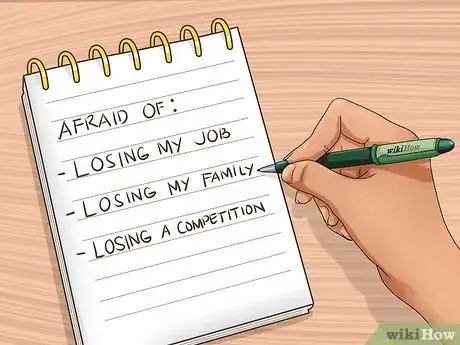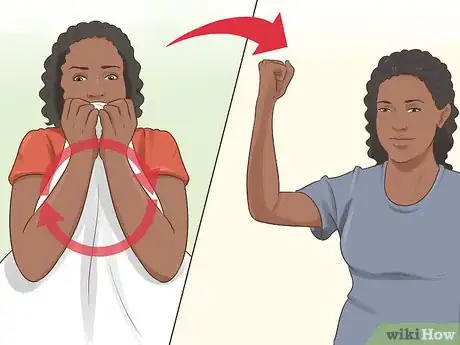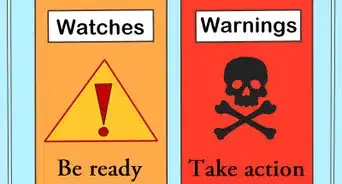This article was co-authored by Rebekka Mars. Rebekka Mars is a Life, Meditation, and Yoga Coach as well as the Founder of Modern Meditation™. She's located in Sarasota, Florida and also works online with people all around the world. With over ten years of experience, Rebekka specializes in Yoga, meditation, and personal training to help clients embrace their body, mind, and soul to find calmness and balance in everyday life. She holds a BA in English from Lindenwood University and has over 1000 hours of Yoga training, holding her ERYT500 certification. Rebekka also serves as a keynote speaker on the topic of modern mindfulness speaking in person and virtually.
There are 10 references cited in this article, which can be found at the bottom of the page.
This article has been viewed 19,292 times.
Taking a leap of faith can be frightening, especially when you are afraid something might go wrong; however, living in fear is no way to live. You can change your outlook by being a bit brave. Understanding why you are afraid is the key to overcoming your worries, and you can do this by reflecting on past circumstances and getting real with yourself. You can also defeat this fear by using helpful strategies to reduce your anxieties and taking the necessary steps to move beyond fear.
Steps
Understanding Why You are Afraid
-
1Look at your past life experiences. Have you had a big disappointment in your life? Do you have a habit of working really hard for something, only to experience failure? If so, these could be the reasons why you face everything with fear. Acknowledging the possibilities for why you are so afraid is the first step in facing your fears and moving on.
- If you can’t figure out what you’re scared of or why on your own, talk to a professional. Speaking to someone who is impartial in your life is a great way to get an outsider’s point of view, which can make you realize what is holding you back.[1]
- You can also ask a trusted friend or family member who has known you for a long time and seen you go through difficult times. They may have some invaluable insights.
-
2Write down what you are afraid of. There’s great power in writing something down. Just like writing a letter to someone you are upset with and never sending it, writing down your fears is an excellent way to get them off of your chest. Getting your fears out in the open by externalizing them like this can help you to let them go.
- For example, you might write down "I'm so happy in my relationship. I think something bad is bound to happen." Include any fears you can think of that are currently affecting your life.
- Decide what you want to do with this paper. You can carry it around with you and take a look at it whenever you start to worry. Seeing your fear out in the open can make you see how silly it may be. You can also tear it up, crumble it into a ball, or burn it, as a symbolic gesture that you’re destroying your fear and letting it go.[2]
- The more you see your fear, expressed in writing, the more desensitized your brain may become to it; however, if you find that reading it is keeping you upset, find a meaningful way to let the paper go.
Advertisement -
3Analyze your fear. Break down what it is that makes you so afraid. In order to understand your fear you need to recognize what's driving it. Beside the list of your fears, try to identify some possible reasons you have this fear.[3]
- With the former scenario, you might analyze what exactly "is bound to happen?" Your partner cheats? This might point to trust issues driving the fear. Someone gets hurts? This may indicate fear of abandonment or being alone.
Defeating Your Fear
-
1Ask yourself what is the worst that can happen. If you’re contemplating applying for a new job, but you’re too afraid of what might go wrong, ask yourself, “What’s the worst that can happen?” Perhaps you don’t like the job, you aren’t fond of your new boss or co-workers, or it’s not what you expected. Although these scenarios aren’t ideal, they certainly aren’t devastating. If you’re unhappy at the new job, you can always ask for your old job back or find a new one.
- Keep in mind that if you were totally satisfied with your situation, you wouldn’t be thinking about changing it. There is a reason why you want to find something new. Staying in a job in which you are unhappy is likely worse than what could happen at a new workplace.[4]
-
2Focus on the present. Stop wondering about what might happen in the future or what has already happened in the past. Instead, focus on what is happening in your life right now, and stop wondering about what could happen or what already did. Your fear of the future or traumatic past experiences you had can stop you from moving forward in your life.
- When you find yourself dwelling on the past or having anxiety about what could be, take a deep breath and bring yourself back to the present. Write down a list of what you love in your life right now and focus on that.
- Realize that all of your experiences have led you to these wonderful achievements. This may help you to calm your fears and understand that the risks you took and failures you may have had in the past has led you to your accomplishments today. [5]
-
3Make quick decisions and avoid obsessing over them. One of the best ways to get over your fear of failing is to make your decisions quickly. Rather than obsessing and analyzing every possible outcome of your choice, dive in head first and just go with your gut.
- Doing so can help you to move on and possibly see that good things come out of taking a leap and just going for it.[6]
- The next time you have to make a decision, set a deadline. Give yourself anywhere from 30 minutes to a full day depending on the significance. For example, if you have been dying for a promotion and you are offered one, you might take that full day. Meanwhile, if you must decide between which classes to enroll in college next semester, allow yourself 30 minutes to an hour to consider your options.
- Set smaller deadlines for researching your options, gathering information, and getting feedback from others.
-
4Surround yourself with positive people. Researchers have noticed that people tend to be influenced by the emotions and moods of those around them. If you don't have supportive friends and/or family — if those closest to you put you down, aren't encouraging, or are negative, you may be picking up on this negativity. This can increase stress and even lead to depression.[7] If you notice some people in your life who are overly negative, make an effort to distance yourself from them. Instead, spend more time with friends who are positive, supportive, and helpful.
- If you're not sure if your support group is all that supportive, start noticing how you feel when you're around them. If you feel tense or stressed when around certain people and experience relief when you're away from them, this might indicate a negative environment.
-
5Get help. Sometimes, our fears prevent us from leading full, satisfying lives. If you are having trouble of overcoming your fear of failure or doom, it may help to talk to a professional. There may be a deeper, underlying cause to your worries that are leaving you immobilized and defenseless. Working with a mental health therapist can help you identify the source of your concerns and come up with effective strategies to overcome them.
- For example, you keep thinking that something will go wrong in your relationship, so you are putting off making a commitment. This might be a good reason to see a therapist to help you deal with the source of your concerns.
Taking the Next Step
-
1Visualize a positive outcome. You’ve already thought about the worst that can happen; in fact, you’ve probably obsessed over it. Instead though, try asking yourself, "What's the best that can happen?" Refocus your thoughts to what happens if it works out. You may have to do this multiple times before you start feeling confident.[8]
- For instance, if you’re thinking about asking someone at the gym out on a date, don’t think about what happens if they say “No.” Instead, think about what could happen if they say “Yes.” You may have a good time, you may go on new dates, and you may find someone you can have a meaningful relationship with for a long time.
-
2Understand the fear may not go away. The truth is, your fear of failing may not ever totally disappear. This is a consistent thought for many people as they strive for success. But what you can do is power through anyways. Take the leap and let your fear fuel you. Use that anxiety for good and allow it to help you get to your goal. The more times you do this, the easier it will become.[9]
- Think about the ways fear can actually be helpful and motivating. If you have a healthy level of fear, you will be more driven to be prepared and conscientious.
-
3Look at potential failure as a way to start fresh. Although failing is never fun, it can create a new beginning. If you are fired from a job or your relationship is over, you now have an opportunity to start over again. That may seem daunting and overwhelming at first, but it’s a chance to do something different.
- Reflect on the experience and write down what you have learned. This may help you concretely see how it was a useful experience.
- Realize that you’re not alone if you fail. Many successful people didn’t hit their stride until many attempts later. Use them as inspiration to not give up.[10]
Expert Q&A
-
QuestionHow do you calm down?
 Rebekka MarsRebekka Mars is a Life, Meditation, and Yoga Coach as well as the Founder of Modern Meditation™. She's located in Sarasota, Florida and also works online with people all around the world. With over ten years of experience, Rebekka specializes in Yoga, meditation, and personal training to help clients embrace their body, mind, and soul to find calmness and balance in everyday life. She holds a BA in English from Lindenwood University and has over 1000 hours of Yoga training, holding her ERYT500 certification. Rebekka also serves as a keynote speaker on the topic of modern mindfulness speaking in person and virtually.
Rebekka MarsRebekka Mars is a Life, Meditation, and Yoga Coach as well as the Founder of Modern Meditation™. She's located in Sarasota, Florida and also works online with people all around the world. With over ten years of experience, Rebekka specializes in Yoga, meditation, and personal training to help clients embrace their body, mind, and soul to find calmness and balance in everyday life. She holds a BA in English from Lindenwood University and has over 1000 hours of Yoga training, holding her ERYT500 certification. Rebekka also serves as a keynote speaker on the topic of modern mindfulness speaking in person and virtually.
Meditation & Yoga Coach Try getting back into your body by deep breathing. Put one hand on your belly and breathe in so your belly rises, then breathe out again slowly. That will help calm your nervous system, which will start to help you feel less anxious. If you still feel anxious, try deliberately thinking about something you really love. That can help bring you down to a more regulated state where you can make more productive decisions.
Try getting back into your body by deep breathing. Put one hand on your belly and breathe in so your belly rises, then breathe out again slowly. That will help calm your nervous system, which will start to help you feel less anxious. If you still feel anxious, try deliberately thinking about something you really love. That can help bring you down to a more regulated state where you can make more productive decisions. -
QuestionHow do I stop being afraid of things that could go wrong?
 Rebekka MarsRebekka Mars is a Life, Meditation, and Yoga Coach as well as the Founder of Modern Meditation™. She's located in Sarasota, Florida and also works online with people all around the world. With over ten years of experience, Rebekka specializes in Yoga, meditation, and personal training to help clients embrace their body, mind, and soul to find calmness and balance in everyday life. She holds a BA in English from Lindenwood University and has over 1000 hours of Yoga training, holding her ERYT500 certification. Rebekka also serves as a keynote speaker on the topic of modern mindfulness speaking in person and virtually.
Rebekka MarsRebekka Mars is a Life, Meditation, and Yoga Coach as well as the Founder of Modern Meditation™. She's located in Sarasota, Florida and also works online with people all around the world. With over ten years of experience, Rebekka specializes in Yoga, meditation, and personal training to help clients embrace their body, mind, and soul to find calmness and balance in everyday life. She holds a BA in English from Lindenwood University and has over 1000 hours of Yoga training, holding her ERYT500 certification. Rebekka also serves as a keynote speaker on the topic of modern mindfulness speaking in person and virtually.
Meditation & Yoga Coach Instead of focusing on worst case scenarios, try asking yourself, "What's the best that could happen?" Remember that the worst-case scenario is just one out of many possible outcomes—focusing on something positive can help shift you out of that catastrophic mindset.
Instead of focusing on worst case scenarios, try asking yourself, "What's the best that could happen?" Remember that the worst-case scenario is just one out of many possible outcomes—focusing on something positive can help shift you out of that catastrophic mindset.
References
- ↑ http://www.planetofsuccess.com/blog/2011/stop-worrying-about-failure/
- ↑ https://zenhabits.net/a-guide-to-beating-the-fears-that-are-holding-you-back/
- ↑ http://liveyourlegend.net/the-3-step-process-to-never-let-fear-stop-you-again/
- ↑ https://uwaterloo.ca/student-success/sites/ca.student-success/files/uploads/files/TipSheet_RealityTesting.pdf
- ↑ https://www.helpguide.org/articles/anxiety/how-to-stop-worrying.htm
- ↑ http://www.timjlawrence.com/blog/2016/1/14/let-yourself-kill-fear
- ↑ https://www.psychologytoday.com/blog/high-octane-women/201210/emotions-are-contagious-choose-your-company-wisely
- ↑ Rebekka Mars. Meditation & Yoga Coach. Expert Interview. 11 September 2020.
- ↑ http://goinswriter.com/afraid/





































































